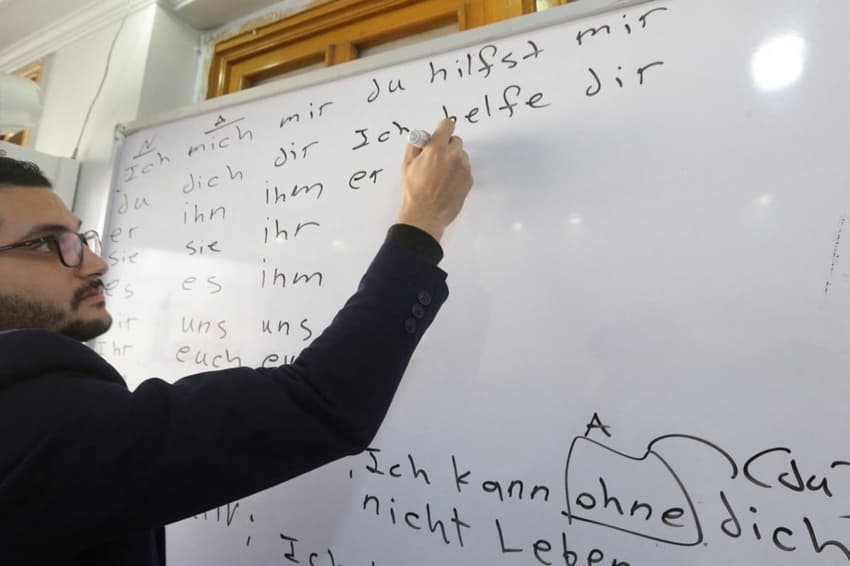15 German words that come from other languages

The German language is riddled with so-called ‘loan words’ and has seen influence from several nations throughout history.
Beginning with Latin, the influence of other languages can be seen in early German, particularly in fields like law, religion and science. The French language then influenced the next wave of loan words throughout the 17th and 18th centuries due to the French aristocracy’s presence in German and Austrian courts. Most recently, the English language has sparked a new series of loan words concurrent with innovation, as shown through the likes of ‘der Computer’, ‘das Internet’ and ‘das Selfie’.
Here are 10 German words that come from other languages, highlighting the scope of languages that have influenced the German of today:
aktuell
Not to be confused with the English ‘actual’ (a false friend), aktuell derives from the French term ‘actuel’, meaning really/present. You will usually hear aktuell used in the media, often referring to the latest information/developments.
dito or detto
Dito originates from the latin verb ‘dicere’, literally to say/to mean. The term then gained its current meaning in the Italian form ‘detto’ and subsequently the French ‘ditto’. Dito was used with the double-T (à la française) until the early 20th century. Today, it is used just as it would be in English. While dito tends to be used in Germany, Austrian German will typically borrow the Italian detto. The meaning, however, remains the same.
eloquent
Eloquent derives from the Latin ‘eloquentia’ and subsequently the identical Old French term ‘eloquent’. Old French was spoken primarily between the 8th and 14th century, dating eloquent back many hundred years. The adjective originated as a term for speaking in a moving and vivid way.
die Empathie
Empathie is a borrowed word from the English language, which then traces back to the Greek language with ‘empatheia’, literally meaning ‘violent passion’. Nowadays that meaning is less emotive and Empathie normally refers to a willingness to empathise with other people’s attitudes.
per se
This useful little phrase originates from Latin and has been replicated within the German language. In Latin, ‘per’ translates to by/through and ‘se’ itself/himself/herself. If somebody says ‘I don’t have a problem with them per se’, you can assume that what they are saying is true, but there are factors that could change this.
polarisieren
This verb meaning to polarise originates from the Greek language, with ‘polus’ translating to ‘turning point’. It is helpful to note that German verbs with the suffix -isieren translate to the English suffix -ise (or in American English, -ize). Some other examples include: brutalisieren (to brutalise), fraternisieren (to fraternise) and modernisieren (to modernise).

Demonstrators march with a banner reading 'Control the borders - not your people' during a rally held by Austria's far-right Freedom Party. Political parties like Austria's FPÖ and Germany's AfD are frequently cited as polarising influences. (Photo by Joe Klamar / AFP)
das Abonnement
This word, meaning subscription, originated in the 18th century from the French ‘abonner’. ‘S’abonner á quelque chose’ literally translates to ‘order a recurring service’. You may see this word, or the shortened version ‘Abo’, used for a season ticket. It is used even more colloquially on online platforms like YouTube - YouTubers often say ‘bitte ein Abo da lassen’, which means please subscribe.
der Chef (die Chefs)
Chef is one of the most notorious false friends in the German language, meaning boss/leader. Its origin can be traced to the same term in French, where it carries a similar meaning. Both the German and French versions of ‘Chef’ have their roots in the Latin word ‘caput’, which translates to ‘head’.
das Kuvert
Ein Kuvert, an envelope, is a loan word from the French ‘couvert’. The noun stems from the verb ‘couvrir’, which literally translates to ‘to cover’. Originally in Latin the verb ‘cooperire’ meant to cover completely.
der Pokal
Pokal derives from the Italian term ‘boccale’ meaning a trophy/cup. It was first used in the 16th century and dates back to the Greek term ‘baukalis’, a narrow-necked cooking vessel. Nowadays, you may see Pokal used in sport competitions with examples including the Konföderationen-Pokal (Confederations Cup) and the UEFA-Pokal (UEFA Cup).

A statue replica of the FIFA World Cup outside Khalifa International Stadium. A high stakes championship like a World Cup might be called a 'Pokal' in German. November. Photo: Jonas Ekströmer/TT
der Rabatt
Rabatt, discount/sale, originated from the Italian term rabatto, or the more commonly-used ribasso. In Italian, ‘abbatere’, is to deduct a sum. The term is thought to have entered German-speaking discourse in the 16th century.
das Portfolio
Whether referring to art pieces or somebody’s assets, you will definitely have heard this noun. Portfolio derives from the Latin terms portare (to carry) and folium (sheet/page), which then evolved into the Italian term ‘portafoglio’.
postfaktisch
Translating as post-factual or post-truth, the Oxford Dictionary declared this as the Word of the Year 2016. The word originates from the English language thanks to the contemporary theory that people will believe something based on personal feelings and emotions rather than facts.
rudimentär
Rudimentär (rudimentary) derives from the French ‘rudimentaire’, normally meaning inadequate/imperfect. It often implies a simplicity to someone/something; for instance, having a rudimentary knowledge of a subject indicates that you have a basic knowledge, but you haven’t delved further.
der Status quo
Der Status quo has stayed true to its original meaning from the Latin Status Quo, literally translating to ‘current state’, or more literally ‘the state in which’. If you hear somebody say ‘Ich befürworte den Status quo’ (I support the status quo), they usually support the current state of affairs, particularly political or social affairs.
Comments (1)
See Also
Beginning with Latin, the influence of other languages can be seen in early German, particularly in fields like law, religion and science. The French language then influenced the next wave of loan words throughout the 17th and 18th centuries due to the French aristocracy’s presence in German and Austrian courts. Most recently, the English language has sparked a new series of loan words concurrent with innovation, as shown through the likes of ‘der Computer’, ‘das Internet’ and ‘das Selfie’.
Here are 10 German words that come from other languages, highlighting the scope of languages that have influenced the German of today:
aktuell
Not to be confused with the English ‘actual’ (a false friend), aktuell derives from the French term ‘actuel’, meaning really/present. You will usually hear aktuell used in the media, often referring to the latest information/developments.
dito or detto
Dito originates from the latin verb ‘dicere’, literally to say/to mean. The term then gained its current meaning in the Italian form ‘detto’ and subsequently the French ‘ditto’. Dito was used with the double-T (à la française) until the early 20th century. Today, it is used just as it would be in English. While dito tends to be used in Germany, Austrian German will typically borrow the Italian detto. The meaning, however, remains the same.
eloquent
Eloquent derives from the Latin ‘eloquentia’ and subsequently the identical Old French term ‘eloquent’. Old French was spoken primarily between the 8th and 14th century, dating eloquent back many hundred years. The adjective originated as a term for speaking in a moving and vivid way.
die Empathie
Empathie is a borrowed word from the English language, which then traces back to the Greek language with ‘empatheia’, literally meaning ‘violent passion’. Nowadays that meaning is less emotive and Empathie normally refers to a willingness to empathise with other people’s attitudes.
per se
This useful little phrase originates from Latin and has been replicated within the German language. In Latin, ‘per’ translates to by/through and ‘se’ itself/himself/herself. If somebody says ‘I don’t have a problem with them per se’, you can assume that what they are saying is true, but there are factors that could change this.
polarisieren
This verb meaning to polarise originates from the Greek language, with ‘polus’ translating to ‘turning point’. It is helpful to note that German verbs with the suffix -isieren translate to the English suffix -ise (or in American English, -ize). Some other examples include: brutalisieren (to brutalise), fraternisieren (to fraternise) and modernisieren (to modernise).

das Abonnement
This word, meaning subscription, originated in the 18th century from the French ‘abonner’. ‘S’abonner á quelque chose’ literally translates to ‘order a recurring service’. You may see this word, or the shortened version ‘Abo’, used for a season ticket. It is used even more colloquially on online platforms like YouTube - YouTubers often say ‘bitte ein Abo da lassen’, which means please subscribe.
der Chef (die Chefs)
Chef is one of the most notorious false friends in the German language, meaning boss/leader. Its origin can be traced to the same term in French, where it carries a similar meaning. Both the German and French versions of ‘Chef’ have their roots in the Latin word ‘caput’, which translates to ‘head’.
das Kuvert
Ein Kuvert, an envelope, is a loan word from the French ‘couvert’. The noun stems from the verb ‘couvrir’, which literally translates to ‘to cover’. Originally in Latin the verb ‘cooperire’ meant to cover completely.
der Pokal
Pokal derives from the Italian term ‘boccale’ meaning a trophy/cup. It was first used in the 16th century and dates back to the Greek term ‘baukalis’, a narrow-necked cooking vessel. Nowadays, you may see Pokal used in sport competitions with examples including the Konföderationen-Pokal (Confederations Cup) and the UEFA-Pokal (UEFA Cup).

der Rabatt
Rabatt, discount/sale, originated from the Italian term rabatto, or the more commonly-used ribasso. In Italian, ‘abbatere’, is to deduct a sum. The term is thought to have entered German-speaking discourse in the 16th century.
das Portfolio
Whether referring to art pieces or somebody’s assets, you will definitely have heard this noun. Portfolio derives from the Latin terms portare (to carry) and folium (sheet/page), which then evolved into the Italian term ‘portafoglio’.
postfaktisch
Translating as post-factual or post-truth, the Oxford Dictionary declared this as the Word of the Year 2016. The word originates from the English language thanks to the contemporary theory that people will believe something based on personal feelings and emotions rather than facts.
rudimentär
Rudimentär (rudimentary) derives from the French ‘rudimentaire’, normally meaning inadequate/imperfect. It often implies a simplicity to someone/something; for instance, having a rudimentary knowledge of a subject indicates that you have a basic knowledge, but you haven’t delved further.
der Status quo
Der Status quo has stayed true to its original meaning from the Latin Status Quo, literally translating to ‘current state’, or more literally ‘the state in which’. If you hear somebody say ‘Ich befürworte den Status quo’ (I support the status quo), they usually support the current state of affairs, particularly political or social affairs.
Join the conversation in our comments section below. Share your own views and experience and if you have a question or suggestion for our journalists then email us at [email protected].
Please keep comments civil, constructive and on topic – and make sure to read our terms of use before getting involved.
Please log in here to leave a comment.